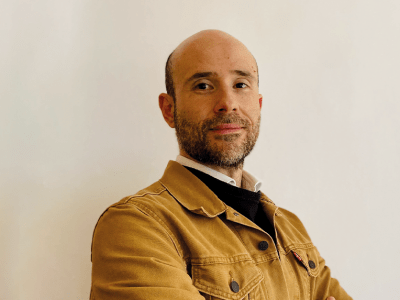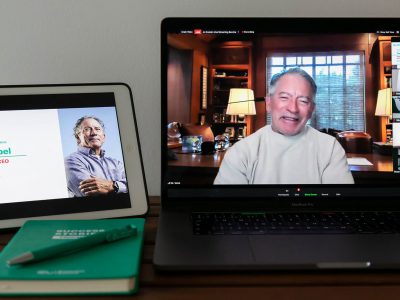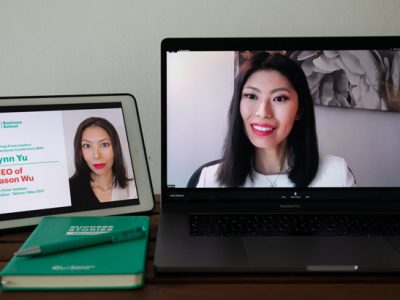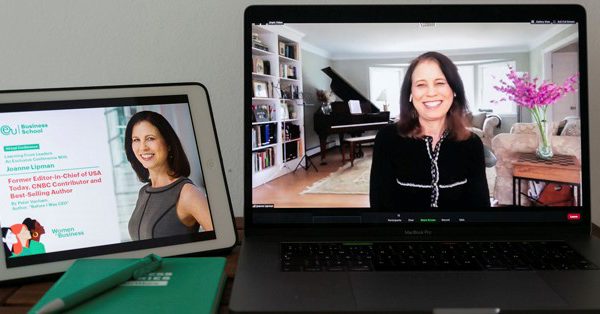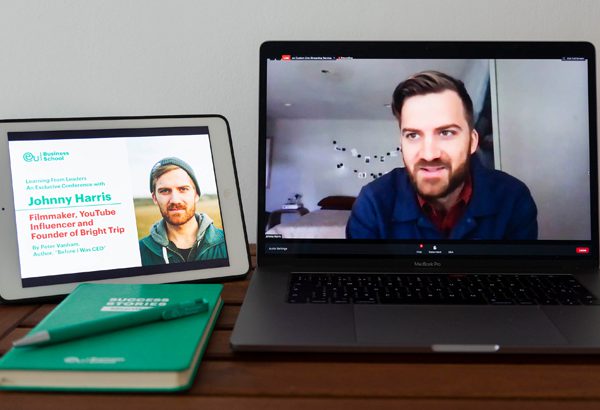The Art of Asking in Uncertain Times – Silvia Bueso
Silvia Bueso knows what it means to navigate uncertain times. When the pandemic hit, her circumstances changed overnight. Her business had been in a good place but suddenly, her activities were canceled and she faced new challenges in her career as well as her personal life. She was confronted with the prospect of supporting her family without the security of her usual income sources. In her presentation, Silvia described this moment as “losing everything”.
However, it was a moment for new beginnings as well as endings. She realized that, although she hadn’t chosen the situation, she could choose to keep fighting for her objectives. What motivated her was a sincere belief in herself and her talents. One affirmation that helped her persevere was: “I am the best choice”. She knew that she had many useful services to offer, so she simply had to adapt to her new circumstances.
What Does It Mean To Ask?
Silvia’s focus is now on “The Art of Asking.” She was an early adopter of webinars at the start of the pandemic, delivering ten free sessions that focused on this theme. Her philosophy is that to ask for something does not burden the person you ask. In fact, it serves them too. Because everyone likes to be useful, she argues: it is a pleasure to be asked to help. Although asking can make you feel vulnerable, it should be reframed as a display of strength. It shows that you are fighting for what you want.
Silvia explained the value of an external perspective. Once she decided to offer her webinars, she called three crucial connections to get their feedback. It’s important to have a clear objective, she said. Once you know what you want to do, you can identify the gaps in your knowledge and the relevant people to help you.
For example, Silvia had the experience and understanding to teach people communication strategies. However, she had never used Zoom in her work. She knew that she’d need support with the technical aspects of her webinars. Although it represented a major obstacle, that was not a reason to cancel them, just a reason to ask for help.
The First Step: Assessing Your Talents
To build a plan when the pandemic struck, Silvia reflected on the ways in which she could be of service to people under these new circumstances. She wrote down three things she could do to help others, and then she worked out how she could use these abilities to also help herself. The webinars she offered were free, so they were a way to serve others. However, they also made her visible to potential future clients. This was one way in which they served her.
Silvia explained that when you are generous with your time and your abilities, people will think of you when it comes to opportunities.
Feel the Fear, Don’t Fight It!
Once Silvia made her plan for her webinars, she experienced a great deal of fear. However, she believes that fear should be taken as a good sign. It is only when we are actually taking action that doubts and insecurity arise. Therefore, all they are is evidence that we are doing something important. Unless we learn to coexist with these fears, we will never take the necessary action to achieve our objectives.
Silvia emphasized the importance of not trying to escape these fears but instead welcoming them. They can help guide you in your plan. If a recurring fear is, “I have no time to do this”, it’s a sign that scheduling will be important. “I don’t have the connections”, shows that networking should be a priority. Your fears should not dissuade you from carrying out a plan. Instead, they can help ensure that you carry it out to the best of your ability.
Turning Objectives Into Action
Once you’ve assessed your abilities, it’s important to have an objective. Silvia reminded students of the SMART model for objectives: they should be specific, measurable, achievable, relevant and timely. She also talked about incorporating the what, where and how into objectives. For example: “I’m going to secure a communications position in a hospital by using my networks”.
When you are clear about what you want to do, that’s the moment for action. Silvia reflected on the importance of timing when it came to the success of her webinars. She announced them as soon as possible, before others had adapted to the new circumstances of the pandemic. This meant that she had a captive audience of people who were newly stuck at home and looking for opportunities. For that reason,1500 people enrolled before she even knew how to operate Zoom.
If Silvia had waited until her strategy was perfect and she was 100% prepared, she would have faced a lot of competition. Part of her success, then, came down to accepting her imperfection. When she suffered technical difficulties during the sessions, Silvia was honest about, and accepting of, her shortcomings. People can connect with your imperfections, she explained. What’s most important is to take action, not to portray perfection.
Short–Term Planning From A to Z
Throughout the pandemic, the futility of long-term planning has been exposed. Situations have continually changed, requiring constant adaptation and a flexible attitude. Silvia recommended that planning now takes place on a month-to-month basis. To structure your plan, you should consider what it is reasonable to ask for and expect at that precise moment.
Although it requires an open mind and some extra creativity, the changeability of the times also opens up opportunities. Keep asking yourself, “what am I able to offer that would be useful at this precise moment?” to be responsive and ensure that your plan always makes sense under the circumstances.
Silvia recommends having a Plan A, a Plan B, and even going all the way to Plan Z if that’s required. Doing so means that you are always choosing your next step, even if it’s not your first choice. It’s one way to retain control and continually progress toward your objectives during uncertain times.
Making Connections and Making Your Offer
Before you contact the significant people in your field, you must do your research. First impressions are important, and it’s crucial that your energy and your message is on point. Silvia recommends social media investigation as well as connecting with HR departments and the university careers department for useful information.
Nobody is going to contact you with an offer, so it’s necessary to be proactive. When making first contact, explain how you can best serve them. Your overriding message should be, “I know you have this need, and I know I can fulfil it with my specific talent”. Silvia emphasizes that selling is also an act of service. It shouldn’t be an attack; it should be an offer to meet the needs of another. If you’re able to prove your worth through an act of generosity, it means you are more likely to be considered for future opportunities.
In this way, “making the ask” is another way to “make the sale”. It’s daring to offer yourself in this way; however, when you know you can be of assistance, it’s also an act of love. You’re not forcing anything. Instead, you’re simply making yourself visible so you can be chosen. You’re making your connection aware of their options. Silvia’s talk ended with a challenge: what are you going to do differently, now that you know how to ask in uncertain times?


